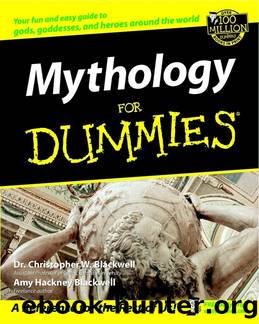Mythology For Dummies by Christopher W. Blackwell & Amy Hackney Blackwell

Author:Christopher W. Blackwell & Amy Hackney Blackwell
Language: eng
Format: epub
Publisher: John Wiley & Sons, Ltd.
Chapter 12
Donât Go Changinâ: Ovidâs Metamorphoses
In This Chapter
Transforming people into spiders and other shapes
Sculpting the perfect relationship with Pygmalion and Galatea
Making beautiful music with Orpheus and Eurydice
Meeting at the mulberry tree with Pyramus and Thisbe (and a lion!)
Growing old with Baucis and Philemon
Merging love and soul with Cupid and Psyche
R oman mythology has lots of good stories involving romantic relationships between gods, mortals, and everything in between. The Romans were excellent story tellers; they were so good, in fact, that their Roman tales of doomed love, mistaken identity, and magical changes are often more famous than the Greek originals.
The Roman author Ovid (43 BCEâ17 CE) had great literary success with his famous work Metamorphoses, in which told a bunch of tales involving individuals who transformed from one shape into another. Ovid drew much of his material from the body of Greek myths, such as the story of Hadesâs rape of Persephone and lots of stuff about the Trojan War and the hero Ulysses (the Latin name for Odysseus). But not all of his stories were Greek, and even those that were became Roman once Ovid was done with them.
Ovidâs Metamorphoses begins with the creation of the world (during which chaos transformed into order), then describes how Jupiter sent a flood to kill all humans, except for the virtuous Deucalion and Pyrrha. Ovid then, for many, many chapters, describes the adventures of the gods, with particular emphasis on their love affairs. After the gods come the heroes of the Trojan War, and last (and best) comes the story of how Julius Caesar turned into a star after his death.
Ovid wasnât the only Roman writer to make myths into fun literature. The story of Cupid and Psyche comes from Apuleius, a Roman writer from the second century CE; he told it in a book that was also called Metamorphoses, just to keep things confusing. The poet Virgilâs poems, his short ones and his great epic, the Aeneid, are bursting at the seams with myths, all of them heavily influenced by Greek myths, but all of them having a distinctive Roman twist.
Download
This site does not store any files on its server. We only index and link to content provided by other sites. Please contact the content providers to delete copyright contents if any and email us, we'll remove relevant links or contents immediately.
Cecilia; Or, Memoirs of an Heiress — Volume 1 by Fanny Burney(32538)
Cecilia; Or, Memoirs of an Heiress — Volume 2 by Fanny Burney(31935)
Cecilia; Or, Memoirs of an Heiress — Volume 3 by Fanny Burney(31925)
The Great Music City by Andrea Baker(31911)
We're Going to Need More Wine by Gabrielle Union(19032)
All the Missing Girls by Megan Miranda(15925)
Pimp by Iceberg Slim(14476)
Bombshells: Glamour Girls of a Lifetime by Sullivan Steve(14046)
For the Love of Europe by Rick Steves(13866)
Talking to Strangers by Malcolm Gladwell(13341)
Norse Mythology by Gaiman Neil(13332)
Fifty Shades Freed by E L James(13228)
Mindhunter: Inside the FBI's Elite Serial Crime Unit by John E. Douglas & Mark Olshaker(9313)
Crazy Rich Asians by Kevin Kwan(9271)
The Lost Art of Listening by Michael P. Nichols(7486)
Enlightenment Now: The Case for Reason, Science, Humanism, and Progress by Steven Pinker(7303)
The Four Agreements by Don Miguel Ruiz(6739)
Bad Blood by John Carreyrou(6609)
Weapons of Math Destruction by Cathy O'Neil(6260)
